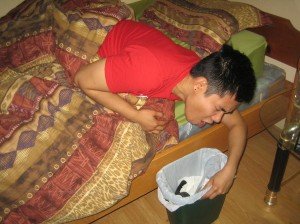Clostridium perfringens food poisoning is triggered by infection with Clostridium perfringens bacterium. This is usually found in the intestines of humans and various animals as well as in the soil and areas contaminated by animal or human feces.
What are the causes?
In most circumstances, Clostridium perfringens food poisoning results if an individual eats poorly cooked and stored foods. Generally, bacteria are present on food after cooking and these are capable of multiplying and cause food poisoning if the food is allowed to sit out and cool before stored in the refrigerator. The commonly infected foods include meat products, meats and gravy.
What are the symptoms of Clostridium perfringens food poisoning?
The indications of this type of food poisoning include:

- Abdominal cramps
- Watery diarrhea
These symptoms typically manifest 6-24 hours after the consumption of foods that contain substantial amounts of the bacteria. Remember that the disease usually ends within 24 hours. The less severe symptoms are likely to last for 1-2 weeks.
Diagnosis
The doctor will perform a medical history and physical examination as well as ask questions regarding the symptoms, foods that were recently eaten and environments at home and at work. Blood tests and stool culture might be done to confirm a diagnosis.
Treatment
The treatment for Clostridium perfringens food poisoning is aimed on managing any complications until it improves. The dehydration due to vomiting and diarrhea is the usual complication. It is not advisable to use medications including antibiotics and other treatments unless recommended by the doctor.
Dehydration can be prevented by taking frequent sips of a rehydration beverage. You can provide a cup of water or rehydration beverage for every episode of substantial, loose stools. Sports drink can also be used. Take note that fruit juices and soda contain high amounts of sugar and not enough essential electrolytes, thus must be avoided.
A healthy diet must be followed. Eating healthy foods will ensure that the individual acquires all the essential nutrients to promote faster recovery. It is vital to avoid foods that are packed with sugar and fat. Spicy foods, coffee and alcohol must be avoided for 2 days after all the symptoms have vanished.
